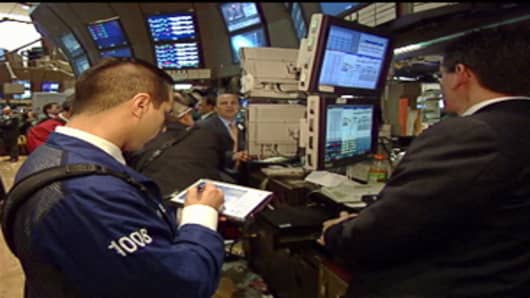A week after the major indexes posted a major surge they now seem to be hitting a major wall, demonstrating that all the good news to hit Wall Street lately hasn't been good enough.
"My gut is telling me that until the oil situation finds a top plateau, we're going to be seeing very odd market reactions--tremendously good days and some not so good days," says Diane de Vries Ashley, managing partner of Zenith Capital Partners. "Oil is the basis of the whole market psychology at the moment."
Stocks tumbled Tuesday after the release of producer price index data, but Ashley says the economic news is only fuel on the oil-based fire. U.S. light, sweet crude again soared to new heights, breaking past $129, dragging the broader market down with it even as averages gained Monday while oil also rose.
There's a feeling that the markets are recoiling from the top of their 200-day moving average, and will trade in a range until oil eases and investors see more good news.
"I personally would start taking money off the table," says Dave Rovelli, managing director of US equity trading at Canaccord Adams of Boston. "I wouldn't chase the market after the move we've had with the resistance in front of you."
Rovelli watches the technological side of the market, and he sees opportunity there for investors seeking safe stock plays while Wall Street spins sideways. He likes Blackberry maker Research in Motion and iPhone and iPod manufacturer Apple as two companies carving out new niches in the market that have strong appeal.
But even with those two companies, he said he would only buy after their stock price has dropped, a play-the-dips strategy he advises with the broader market, which he doesn't see having much room to the upside.
"You would need a lot of volume and the volume isn't there," Rovelli says.
Among the most often-cited fears for the market ahead, besides oil, are potentially more trouble for financial institutions, food inflation that is weighing on consumer spending and the lingering problems in the housing market.
Federal Reserve Vice Chairman Donald Cohn warned Tuesday that housing and credit issues would continue to bedevil the economy, while investors Boone Pickensand Warren Buffettboth issued warnings about oil prices.
On the positive side, the market are surviving a busy news cycle and a strong surge up with relatively modest selloffs in between. Volatility, a hallmark of the market's slump that began last September, has all but vanished as the Chicago Board Options Exchange's Volatility Index has dropped to levels not seen since early October, though the Vix gained as stocks fell Tuesday.
And there are some who believe better times are yet to come.
"What the market has to start with is some positive psychology and some momentum on the upside, and this was a very constructive weak for that," says Charles Massimo, president of CJM Fiscal Management. "You started to see a rash of money come into the market, though not nearly as much as I'd like to see for a full turnaround."


